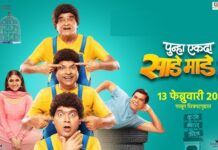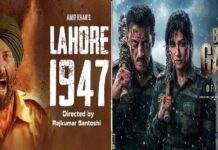Dharma Productions and Mentor Disciple Entertainment’s Sunny Sanskari Ki Tulsi Kumari (UA) is the story of break-ups and hook-ups.
Sunny (Varun Dhawan) has just had a break-up with girlfriend Ananya (Sanya Malhotra). Ananya is now scheduled to marry Vikram (Rohit Saraf) who has dumped his girlfriend, Tulsi Kumari (Janhvi Kapoor). Ananya has declined Sunny’s marriage proposal because of, among other reasons, her parents’ disapproval of the boyfriend. Similarly, it is Vikram’s mother and brother who don’t approve of Tulsi. What’s more, Ananya and Vikram are now scheduled to get married to one another as their status-conscious parents are both quite equal in that sense. Sunny seeks Tulsi out, and the two decide to feign a romance right in front of their exes in the hope that jealousy would prompt Ananya to return to Sunny, and Vikram to marry Tulsi. Like Sunny is unable to get over Ananya, Tulsi is still madly in love with Vikram. Sunny and Tulsi pretend to be in a relationship right at the pre-wedding and wedding celebrations of Vikram and Ananya. What happens finally?
Shashank Khaitan’s story is childish. One has seen many such films in which one side-track is of a boy or a girl trying to make his/her ex-partner jealous after a break-up. To take such a side-track as the main story in a film is not the wisest thing Khaitan has done. What’s more, many of the comedy scenes simply don’t tickle the funny bone and hence the fun in trying to re-ignite the two love stories just doesn’t come through. Shashank Khaitan’s screenplay is very weak. For one, since the love story of neither Sunny and Ananya nor Tulsi and Vikram has been shown to the audience (because the film starts with the two break-ups), one doesn’t know the kind of involvement of Vikram (with Tulsi) and of Ananya (with Sunny) and, therefore, the scenes of jealousy are often far less impactful. In a story of this kind, it was imperative for the writer to have shown what kind of relationship and love there existed between Sunny and Ananya as well as between Tulsi and Vikram. Also, the comedy often looks so forced that the viewers understand that the drama is not moving seamlessly. Yes, a few scenes are funny but they aren’t enough. With a title like this, it is already clear to the audience what the climax has in store for them. Also, since the characters of Ananya and Vikram are played by actors who are far lesser in popularity and image than the actors essaying the characters of Sunny and Tulsi, even a novice would understand how the comedy film would end. It is in such dramas that casting has to be taken very seriously. Clearly, that seriousness is missing because anybody would understand which hero would get Janhvi Kapoor or, similarly, which heroine would get Varun Dhawan. Of course, that’s evident in many love stories, but it shouldn’t have been so obvious in this drama because the intrigue value should be one of the biggest mainstays. The pre-climax and climax have some intrigue value (in the writing, if one were to overlook the two aforementioned giveaways), but having said that, it must be added that the viewers will not approve of the four lead characters being tossed around like ping pong balls. Shashank Khaitan and Ishita Moitra’s dialogues are good at places but they often fall flat on their face in the comedy scenes.
Before talking about the performances of individual actors, two important points need to be emphasised. None of the actors is subtle although subtlety was the need of the script. Secondly, the actors cast in the roles of the parents of the lead actors leave a lot to be desired as far as face value is concerned.
Varun Dhawan is not up to the mark as Sunny. He overacts and tries to be funny but is let down by a terribly weak script. He doesn’t look fresh in many scenes. Varun ought to take care of his pronunciations. Note, for example, how he pronounces the name of one of Indian cinema’s biggest blockbusters. Instead of Bahubali (pronounced ‘Baahubali’), he pronounces it as ‘Bhaubali’. Quite funnily, he gets the pronunciation right when he repeats the word after Ananya in a scene. Janhvi Kapoor is also not at all subtle in the role of Tulsi Kumari. She is unable to evoke sympathy for her character because of lack of subtlety in her acting. Sanya Malhotra is okay as Ananya. Rohit Saraf is ordinary as Vikram. Manish Paul entertains only at times as wedding planner Kuku. Akshay Oberoi has his moments as Param Singh. Abhinav Sharma is average as Sunny’s friend, Buntu. Manini Chadda makes her presence felt as Rakhi Singh. Mallika Chhabra is ordinary as Nisha. Prajakta Koli is passable as Dimple. Nazneen Madan is effective as Ananya’s mother. Monika Kohli is routine as Vikram’s mother. Kavita Pais hardly impresses as Sunny’s mother. Gaurav Sikri is so-so as Ananya’s father. Rohitashv Gour is fair as Sunny’s father. Dharna Durga is alright as Tulsi’s friend. Ankush Deshmukh (as the school guard), Gargi Patel (as the school principal), Sonali (as the yoga instructor), and the others pass muster.
Shashank Khaitan’s direction is weak. His comedy is dull, and he has not been able to extract effective performances from any of his lead or, for that matter, even his supporting cast members. Music (Tanishk Bagchi and Ravi Pawar for Bijuria; A.P.S. for Panwadi and Ishq manzoor; Tanishk Bagchi for Tumse behtar and ‘Sunny sunny boy’; Sachet-Parampara for Tu hai meri; Guru Randhawa, Rony Anjali and Gill Machhrai for ‘Perfect’) is the best part of the film. The Bijuria and Panwadi songs are excellent while all the other songs are also entertaining. Lyrics (Manoj Muntashir for Tumse behtar; Sonu Nigam and Ajay Jhingran for Bijuria; Jairaj for Panwadi and Ishq manzoor; Kauser Munir for Tu hai meri; Guru Randhawa, Gill Machhrai and Rony Anjali for ‘Perfect’; Azeem Dayani for ‘Sunny sunny boy’) go well with the mood of the film. Song picturisations (Bosco Leslie Martis, Ganesh Acharya and Piyush-Shazia) are eye-filling but there’s no novelty in the song picturisations. John Stewart Eduri’s background music is alright. Manush Nandan’s cinematography is excellent. Vikram Dahiya’s action and stunt scenes are functional. Kshamata Gurav and Swapnil Suraikar’s production designing is of a good standard. Editing (by Manan Sagar and Charu Shree Roy) leaves something to be desired.
On the whole, Sunny Sanskari Ki Tulsi Kumari is a dull fare and will not be able to sustain at the ticket windows for more than a couple of days. Besides its music, its release on the festive occasion of Dassera is the other biggest point in its favour as far as business is concerned.
Released on 2-10-’25 at Inox (daily 9 shows) and other cinemas of Bombay by Dharma Productions. Publicity: excellent. Opening: ordinary in some cinemas, above average at others. …….Also released all over. Opening ranged from below-average to fair.




























